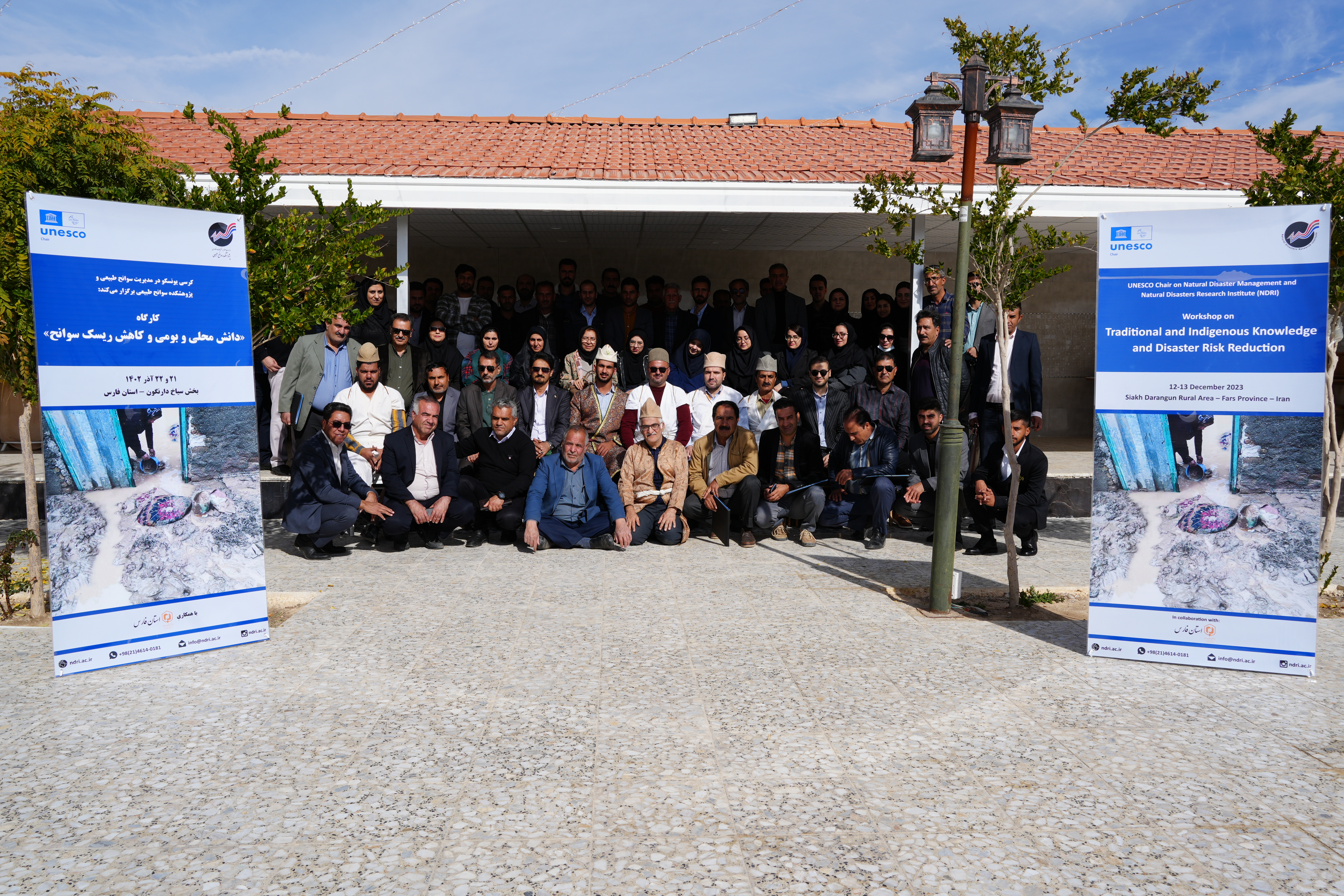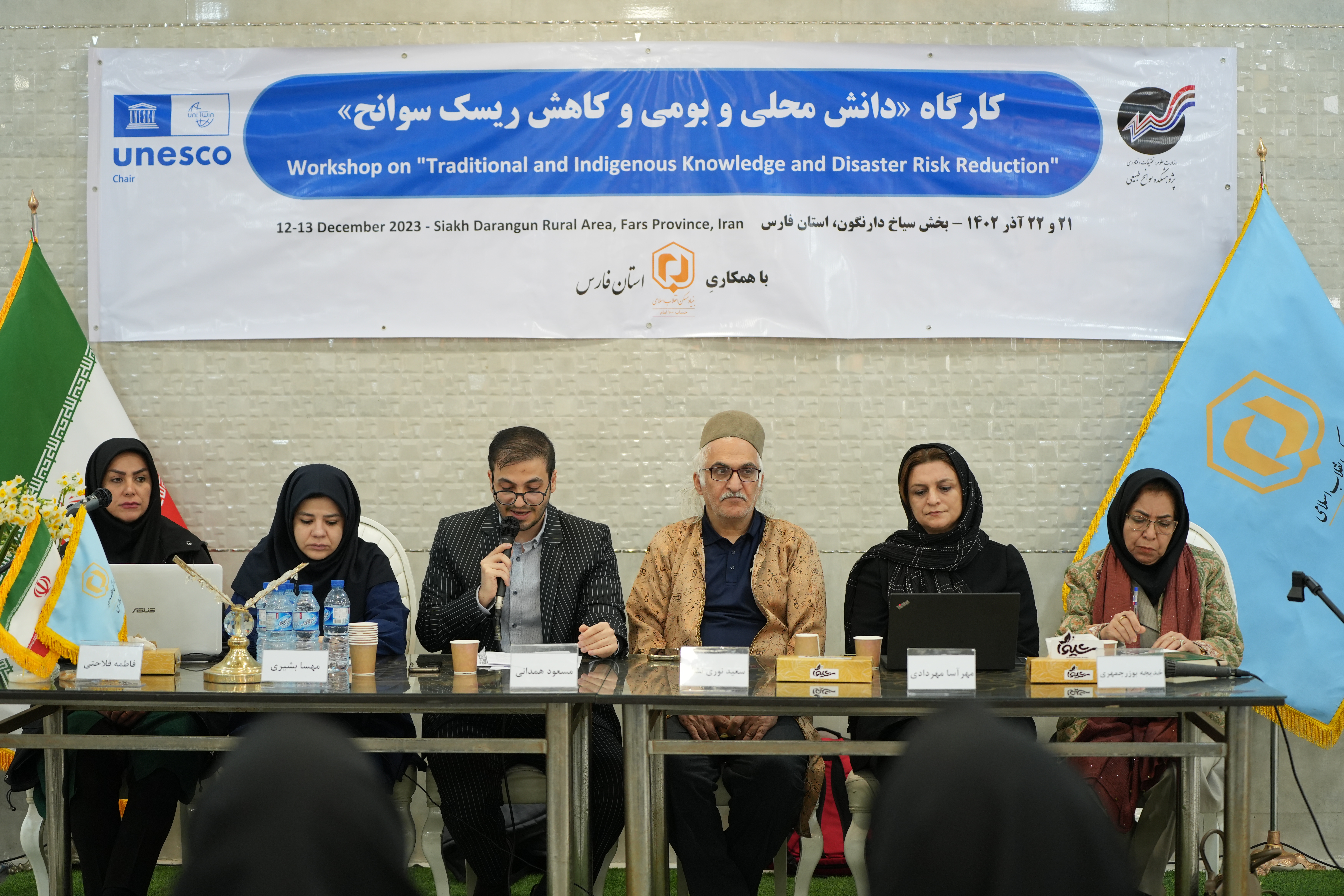
The Natural Disasters Research Institute (NDRI) and UNESCO Chair on Natural Disaster Management, in collaboration with the UNESCO office in Tehran organized the Participatory Workshop on Traditional and Indigenous Knowledge and Disaster Risk Reduction.
The Natural Disasters Research Institute (NDRI) and UNESCO Chair on Natural Disaster Management, in collaboration with the UNESCO office in Tehran organized the Participatory Workshop on Traditional and Indigenous Knowledge and Disaster Risk Reduction. This event took place on December 12 and 13, 2023, in the rural district of Siakh-Darengun, located in Shiraz Country, Fars Province, Iran. The workshop witnessed the active participation of approximately 85 individuals including rural women and men, academia, local government officials, community facilitators of local development plans, as well as experts from NDRI and UNESCO.
The main focus of the workshop was to explore the relationship between traditional and indigenous knowledge, disasters, and the role of local knowledge in mitigating disaster risks. Participants engaged in various working groups, discussing and defining traditional and indigenous knowledge concerning disaster risks. They also shared examples of traditional and indigenous knowledge specific to Iran. Additionally, the members identified challenges and put forth several recommendations.
The opening of the workshop was held with the presence of local officials, including Shiraz Governor's Civil Deputy, Siakh Darengun Governor, Fars Housing Foundation representatives and the UNESCO Tehran office expert.
At the beginning of the workshop, Masoud Hamdani, Director of International Affairs of the Natural Disasters Research Institute, while welcoming the attendees, emphasized: reducing the risk of disasters will be possible with public participation.

Emphasizing the need to pay attention to the trans-sectoral and multi-dimensional view, Hamedani considered benefiting from local knowledge as an effective step in improving the knowledge of natural disasters.
In the continuation of the opening, Mahsa Bashiri, Deputy Head of NDRI and Secretary of the UNESCO Chair on Natural Disaster Management, while expressing the research institute's gratitude to the authorities and colleagues for holding the workshop, called this workshop a turning point in the direction of increasing resilience against disasters.
Bashiri added “using native and local knowledge is a new approach in the risk management of disasters. People's lived experience as a valuable treasure can lead to increasing resilience and reducing the risk of natural disasters.
Next, Mehrasa Mehrdadi, Director of the Natural Sciences Department of the UNESCO office in Tehran, translated into Farsi the video message of Nigel Crawhall, the Chief of Section for Small Islands and Indigenous Knowledge at UNESCO.
In this message, Crawhall, while expressing his satisfaction with holding this workshop, said that when we talk about indigenous, local or traditional knowledge we're mostly speaking about knowledge that has been gained by communities over many years sometimes even centuries sometimes even longer and that has passed orally within their own cultural traditions, their own languages but often with a lot of details about the environment in which people are living and those resources which they need to sustain.
Mentioning examples related to the role of native and local knowledge in reducing the risk of disasters, he said that indigenous and local knowledge can be very effective in various ways such as forecasting and reduction of disaster risk, coping during a crisis and recovery after a crisis.
During the two-day workshop, three group activities were planned: Working groups on definitions; working groups on local knowledge in risk reduction and working groups on challenges and recommendation. On the second day, the last two group activities were merged into one group task.
In the following, Khadijah Buzarjomehri, a member of the retired academic staff of Ferdowsi University of Mashhad, explained the terms and concepts of local knowledge and gave its different definitions. She said that local knowledge is based on experience, it is local, simple and dynamic, and it is compatible with the local environment and culture, and it is mainly transmitted orally.
She further explained the role of native and local knowledge in various fields such as environmental protection, food security and poverty reduction, local self-reliance, cultural enhancement and identity and reduction of risks of natural disasters and added: one of the options available to mankind for responding to natural hazards is the use of indigenous knowledge and accumulated and historical wisdom.
Fatemeh Falahati, a member of the academic staff and the director of the NDRI hydrological hazard research group, also discussed the reasons for the occurrence of hazards in this workshop and emphasized that human intervention causes such disasters or their exacerbation, and local knowledgeable people, who are the same local people, should help to reduce the risk of disasters.
Dr. Falahati gave an explanation about the plan to identify villages at risk and said that more than 200 villages have been identified in Fars province that are at risk of multiple disaster risks.
On the second day of the workshop, Seyed Amir Hossein Garakani, the head of the Natural Disasters Research Institute, emphasized on the influence of native and local knowledge, and said that throughout history, people have always adapted to their native knowledge in this disaster-stricken country with their high adaptability to the environment.
Dr. Garakani emphasized that the integration of indigenous knowledge and modern technologies will lead to effective management of incidents and accidents.
In the second group activity, the participants explored examples related to traditional and indigenous knowledge for forecasting, managing and reducing the risks of natural disasters. The participants were divided into five groups (according to their interests and experiences): (1) earthquake, (2) water and flood, (3) drought, (4) forest fire, and (5) other risks.
The recommendations raised by the five group activities can be summarized as follow:
Emphasis on people's participation as well as watershed and aquifer management, preservation of vegetation were among the most important recommendations.
The workshop ended with the speeches of Mr. Masoud Hamdani, Dr. Bashiri and Mrs. Mehrasa Mehrdadi. The speakers thanked the participation of the local communities, especially the villagers of the villages, the mayor, as well as the presence of officials from government agencies such as the Department of Environment (DOE), the General Directorate of Natural Resources and Watershed Management, the Housing Foundation, the Cultural Heritage and Tourism Organization, the Agricultural Jihad Organization, and the Governorate. The participation of local communities at this stage can be an important step not only for the development of the area, but it will also help to reduce the risks of natural disasters in a better planning based on traditional and indigenous knowledge.
All rights reserved for Natural Disasters Research Institute.
Design and developments by Armanic